Top 7 Email Marketing CRM Tools in '24 Based on 30k Reviews
CRM email marketing refers to the integration of customer relationship management (CRM) with email marketing platform capabilities.
The objective is to leverage detailed customer data stored in the CRM system to increase automation and create more personalized, targeted, and effective email marketing campaigns. This leads to streamlined customer relationship management and communications.
Discover top 7 email marketing CRM software by analyzing the key components, benefits and strategies of CRM email marketing tools.
Top 7 email marketing CRM software comparison
| Vendor | Average rating | Starting price/month | Free plan |
|---|---|---|---|
| ActiveCampaign | 4.5/5 based on 11,054 reviews | $29/user | ❌ |
| Freshmarketer by Freshworks | 4.5/5 based on 7,227 reviews | $15/user | 100 contacts |
| Zoho CRM | 4.3/5 based on 6,673 reviews | $15/user | Up to 3 users |
| Brevo | 4.5/5 based on 1,948 reviews | $12/user | 50 open deals |
| Keap | 4.2/5 based on 1,525 reviews | $159 with 1500 contacts and 2 users | ❌ |
| Insightly | 4.2/5 based on 893 reviews | $29/user for CRM plan, $349 with 2 users for all-in-one
plan
| Up to 2 users |
| Engagebay | 4.7/5 based on 673 reviews | $13/user | 250 contacts |
The vendors are sorted based on the number of reviews. Sources:
- Number of reviews are gathered from B2B review platforms G2 and Capterra.
- Pricing information is obtained from the vendor websites.
Vendor selection criteria
There are many CRM software with various features with different pricing plans. To give a comprehensive overview on email marketing CRM, we narrowed down our selection to vendors:
- whose primary focus is email marketing, sales and marketing automation
- with more than 650 reviews obtained from B2B review platforms.
Detailed evaluation of CRM email marketing tools
ActiveCampaign
With ActiveCampaign’s built-in CRM, businesses can automate email marketing campaigns and sales operations. ActiveCampaign also provides a customer experience automation feature to support small businesses on managing customer relationships.
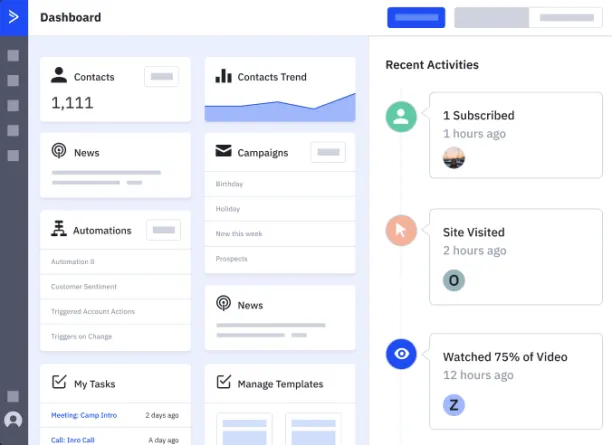
Figure 1: ActiveCampaign CRM customer dashboard example.1
Freshmarketer by Freshworks
Freshmarketer enables multi-channel marketing automation with CRM for eCommerce businesses. With Freshmarketer, businesses can utilize personalized engagement across email, SMS, WhatsApp, social media, and live chat channels.
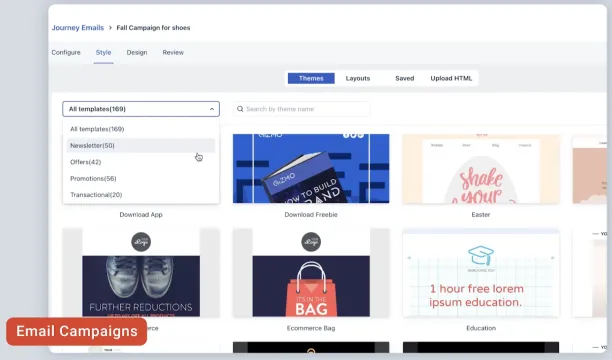
Figure 2: Freshmarketer marketing email templates.2
Zoho CRM
Zoho CRM is a CRM platform that enables businesses to manage their sales, email marketing campaigns, customer support, and inventory management in a single system.
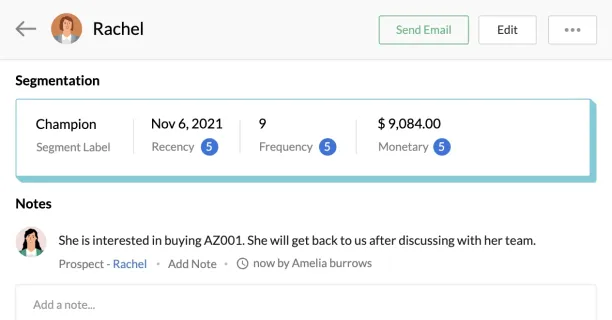
Figure 3: Zoho CRM customer segmentation feature based on CRM customer data.3
Brevo
Brevo offers a unified solution primarily focusing on marketing automation, email marketing, and sales management. It enables businesses to manage customer data, personalize marketing efforts, and streamline sales processes.
Keap
Keap is designed to facilitate growth for small businesses by integrating various functionalities such as CRM, sales and marketing automation into a single platform.
Some of the main features include advanced contact organization, account and company management, webforms and landing pages creation, lead scoring, sales pipeline management, email and text marketing and advanced automation for sales and marketing processes.
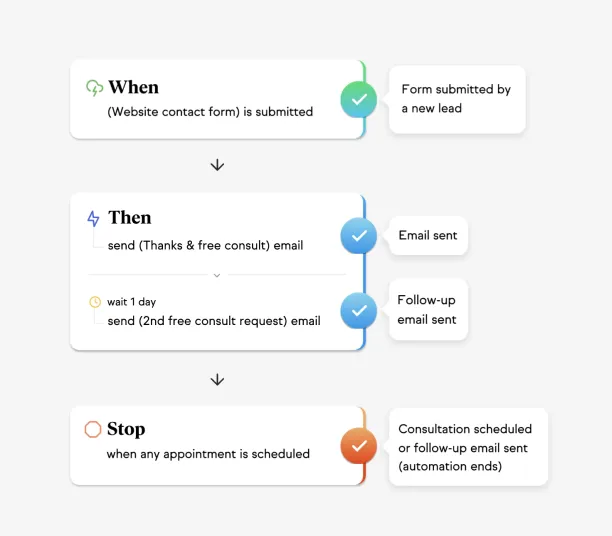
Figure 4: Keap marketing automation example.4
Insightly
Insightly offers an all-in-one platform with marketing automation features and CRM software for small businesses to enterprises.
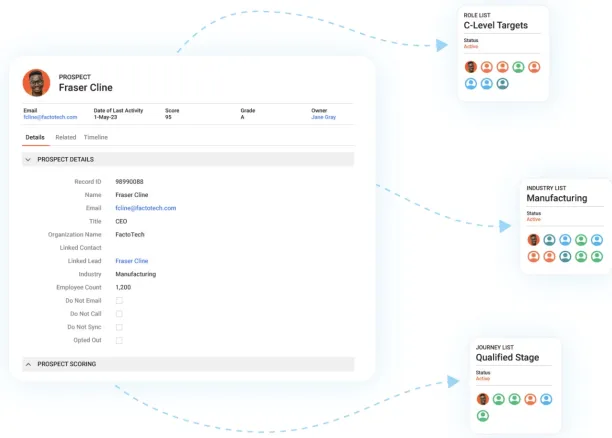
Figure 5: Insightly dynamic list segmentation feature using CRM data.5
Engagebay
Engagebay provides different packages for businesses to choose from such as marketing bay with marketing automation, SMS marketing, email A/B testing and workflows, or sales suite with sales CRM, CRM email integration and lead management, or all-in-one suite encompassing all sales and marketing features.
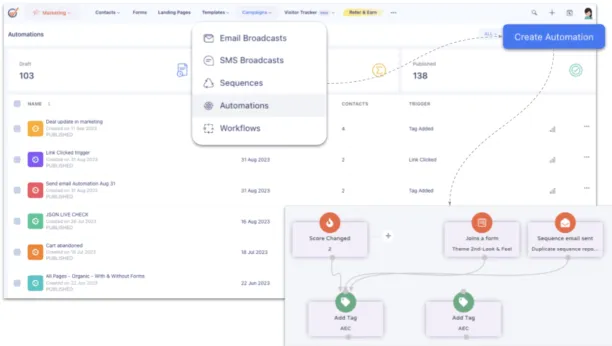
Figure 6: Engagebay marketing automation example.6
What is customer relationship management (CRM)?
CRM refers to a combination of practices, strategies, and technologies that companies use to manage and analyze customer interactions and data throughout the customer lifecycle. The goal of CRM is to improve business relationships with customers, assist in customer retention, and drive sales growth.
CRM tools compile data from a range of different communication channels, including a company’s website, telephone, email, live chat, marketing materials, and social media. They allow businesses to learn more about their target audiences and how to best cater to their needs, thus enhancing customer service and maintaining relationships.
CRM software stores information such as customer contact details, purchase history, preferences, engagement history, and more. This comprehensive view of the customer helps businesses understand their needs, preferences, and behavior.
What is email marketing?
Email marketing software is equipped with a variety of tools that serve different aspects of email marketing. These platforms offer functionalities for creating and customizing email templates, enabling marketers to design visually appealing and effective emails.
Additionally, email marketing software streamline the email marketing process through automation features, which enables scheduling and sending emails based on predefined triggers or actions taken by recipients.
Another capability of email marketing tools is audience segmentation, where users can categorize their audience into different groups based on their behaviors, such as past interactions with emails, or demographic characteristics, like age or location. This targeted approach ensures that the right messages reach the most relevant audience segments.
Furthermore, email marketing services provide comprehensive analytics tools that help marketers assess the effectiveness of their email campaigns. By analyzing metrics such as open rates, click-through rates, and conversion rates, marketers can gain insights into how well their emails are performing and make informed decisions to optimize future campaigns.
Check out email marketing platforms for a comprehensive overview on our selection of email marketing tools.
Key components of email marketing CRM
Data collection and management
The foundation of CRM email marketing lies in collecting a wide range of customer data, including contact information, demographic details, purchase history, online behavior, and engagement with previous marketing efforts. This data is then organized and managed within the CRM system.
Segmentation
Using the data within the CRM, businesses can segment their audience into smaller, more targeted groups based on various criteria such as age, location, purchase behavior, and engagement levels. This allows for more tailored and relevant email marketing campaigns.
Personalization
Beyond using a customer’s name, personalization involves tailoring the content of emails based on the specific interests, behaviors, and history of the recipient. This can include personalized product recommendations, content, and offers.
Automation
CRM systems often include or integrate with marketing automation tools that can trigger specific email communications based on predefined criteria, such as a welcome email after sign-up, a birthday discount, or a follow-up email after a purchase.
Tracking and analytics
CRM email marketing involves tracking the performance of email campaigns and the actions recipients take, then feeding this information back into the CRM system. This data helps in understanding the effectiveness of campaigns and in refining future email marketing strategy.
Benefits of utilizing CRM with email marketing
Using a tool that combines CRM with email marketing offers several advantages for businesses aiming to optimize their marketing efforts and enhance customer relationships. Here’s why integrating CRM with email marketing can be particularly beneficial:
Centralized data management
Unified customer view: CRM systems provide a comprehensive view of each customer, including their contact information, interaction history, purchase records, and preferences. When integrated with email marketing, this information enables highly personalized and relevant communications.
Data consistency: Having a single source to manage customer data reduces the risk of discrepancies and ensures that all customer interactions are based on the latest and most accurate information.
Enhanced personalization and segmentation
Targeted campaigns: With access to detailed customer data from the CRM, businesses can segment their audience more effectively based on various criteria such as demographics, purchase history, or engagement level. This allows for more targeted and relevant email campaigns.
Dynamic content: CRM data enables the creation of dynamic content that changes based on the recipient’s information or past behavior, which would increase the relevance and effectiveness of email marketing efforts.
Improved efficiency and automation
Workflow automation: Integrating CRM with email marketing allows for the automation of routine tasks, such as sending welcome emails to new subscribers, follow-up emails after a purchase, or re-engagement emails to inactive customers.
Trigger-based emails: Automated emails can be triggered by specific customer actions or milestones stored in the CRM, such as visiting a particular webpage, abandoning a shopping cart, or reaching a customer loyalty milestone.
Tracking and analytics
Comprehensive insights: CRM with email marketing provides a more holistic view of marketing performance, including how email campaigns influence customer behavior and contribute to sales and retention.
ROI measurement: Integrating email marketing metrics with CRM data helps in more accurately measuring the return on investment (ROI) of marketing campaigns, by linking email engagement directly with sales and other desired outcomes.
Enhanced customer experience
Consistent communication: With a unified CRM email marketing platform, all customer touchpoints can be managed while ensuring consistent and coherent communication across different channels.
Customer lifecycle management: The integration allows businesses to guide customers through different stages of their lifecycle more effectively, from lead acquisition and conversion to retention and loyalty building.
Scalability and flexibility
Grow with your business: Tools that combine CRM with email marketing can usually scale with your business, which would accommodate an increasing number of contacts and more complex marketing strategies over time.
Customization: Many email marketing CRM tools offer a high degree of customization, allowing businesses to tailor the system to their specific needs and workflows.
Strategies for efficient CRM email marketing
When CRM and email marketing are combined, businesses can use the customer data from their CRM systems to segment their audience, personalize their messages, and send the right message to the right person at the right time. Strategies to boost your email marketing efforts with CRM includes:
Welcome series: Sending a series of welcome emails to new subscribers to introduce your brand and set the tone for future email marketing communications.
Re-engagement campaigns: Targeting inactive subscribers with special offers or content to revive their interest in your brand.
Behavioral triggers: Sending emails based on specific customer behaviors, such as abandoning a shopping cart, visiting a particular page on your website, or making a purchase.
Segmented newsletters: Creating different versions of your newsletters for different segments of your audience to increase relevance and engagement.
Customer journey mapping: Designing and automating email sequences that correspond to different stages of the customer journey, from awareness and consideration to purchase and loyalty.
Further reading:
- Top 10 Email Marketing Benefits in 2024
- Top 10 Email Marketing Best Practices in 2024
- Top 5+ Applications of Generative AI for Email Marketing in 2024
- Email Marketing Benchmarks: Key Insights & Statistics in 2024
- Transactional Email vs Marketing Email: Understanding the Differences
External links:
- 1. “CRM 101: A Complete Guide to Sales CRM“. ActiveCampaign. Retrieved April 3, 2024
- 2. “Freshmarketer: All-in-one Marketing Automation for Email & SMS“. Freshworks. Retrieved April 3, 2024
- 3. “Zoho CRM: Unified marketing platform“. Zoho CRM. Retrieved April 3, 2024
- 4. “Marketing Automation Examples“. Keap. Retrieved April 3, 2024
- 5. “Best-In-Class Marketing Automation Software“. Insightly. Retrieved April 3, 2024
- 6. “Marketing Automation 101, And How EngageBay Helps“. EngageBay. Retrieved April 3, 2024

Cem is the principal analyst at AIMultiple since 2017. AIMultiple informs hundreds of thousands of businesses (as per Similarweb) including 60% of Fortune 500 every month.
Cem's work has been cited by leading global publications including Business Insider, Forbes, Washington Post, global firms like Deloitte, HPE, NGOs like World Economic Forum and supranational organizations like European Commission. You can see more reputable companies and media that referenced AIMultiple.
Throughout his career, Cem served as a tech consultant, tech buyer and tech entrepreneur. He advised enterprises on their technology decisions at McKinsey & Company and Altman Solon for more than a decade. He also published a McKinsey report on digitalization.
He led technology strategy and procurement of a telco while reporting to the CEO. He has also led commercial growth of deep tech company Hypatos that reached a 7 digit annual recurring revenue and a 9 digit valuation from 0 within 2 years. Cem's work in Hypatos was covered by leading technology publications like TechCrunch and Business Insider.
Cem regularly speaks at international technology conferences. He graduated from Bogazici University as a computer engineer and holds an MBA from Columbia Business School.
Sources:
AIMultiple.com Traffic Analytics, Ranking & Audience, Similarweb.
Why Microsoft, IBM, and Google Are Ramping up Efforts on AI Ethics, Business Insider.
Microsoft invests $1 billion in OpenAI to pursue artificial intelligence that’s smarter than we are, Washington Post.
Data management barriers to AI success, Deloitte.
Empowering AI Leadership: AI C-Suite Toolkit, World Economic Forum.
Science, Research and Innovation Performance of the EU, European Commission.
Public-sector digitization: The trillion-dollar challenge, McKinsey & Company.
Hypatos gets $11.8M for a deep learning approach to document processing, TechCrunch.
We got an exclusive look at the pitch deck AI startup Hypatos used to raise $11 million, Business Insider.
To stay up-to-date on B2B tech & accelerate your enterprise:
Follow on
Comments
Your email address will not be published. All fields are required.